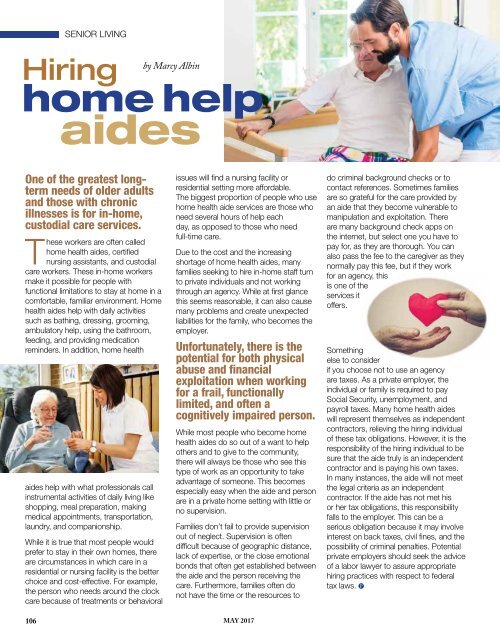May 2017
Create successful ePaper yourself
Turn your PDF publications into a flip-book with our unique Google optimized e-Paper software.
SENIOR LIVING<br />
Hiring<br />
by Marcy Albin<br />
home help<br />
aides<br />
One of the greatest longterm<br />
needs of older adults<br />
and those with chronic<br />
illnesses is for in-home,<br />
custodial care services.<br />
These workers are often called<br />
home health aides, certified<br />
nursing assistants, and custodial<br />
care workers. These in-home workers<br />
make it possible for people with<br />
functional limitations to stay at home in a<br />
comfortable, familiar environment. Home<br />
health aides help with daily activities<br />
such as bathing, dressing, grooming,<br />
ambulatory help, using the bathroom,<br />
feeding, and providing medication<br />
reminders. In addition, home health<br />
aides help with what professionals call<br />
instrumental activities of daily living like<br />
shopping, meal preparation, making<br />
medical appointments, transportation,<br />
laundry, and companionship.<br />
While it is true that most people would<br />
prefer to stay in their own homes, there<br />
are circumstances in which care in a<br />
residential or nursing facility is the better<br />
choice and cost-effective. For example,<br />
the person who needs around the clock<br />
care because of treatments or behavioral<br />
106<br />
issues will find a nursing facility or<br />
residential setting more affordable.<br />
The biggest proportion of people who use<br />
home health aide services are those who<br />
need several hours of help each<br />
day, as opposed to those who need<br />
full-time care.<br />
Due to the cost and the increasing<br />
shortage of home health aides, many<br />
families seeking to hire in-home staff turn<br />
to private individuals and not working<br />
through an agency. While at first glance<br />
this seems reasonable, it can also cause<br />
many problems and create unexpected<br />
liabilities for the family, who becomes the<br />
employer.<br />
Unfortunately, there is the<br />
potential for both physical<br />
abuse and financial<br />
exploitation when working<br />
for a frail, functionally<br />
limited, and often a<br />
cognitively impaired person.<br />
While most people who become home<br />
health aides do so out of a want to help<br />
others and to give to the community,<br />
there will always be those who see this<br />
type of work as an opportunity to take<br />
advantage of someone. This becomes<br />
especially easy when the aide and person<br />
are in a private home setting with little or<br />
no supervision.<br />
Families don’t fail to provide supervision<br />
out of neglect. Supervision is often<br />
difficult because of geographic distance,<br />
lack of expertise, or the close emotional<br />
bonds that often get established between<br />
the aide and the person receiving the<br />
care. Furthermore, families often do<br />
not have the time or the resources to<br />
MAY <strong>2017</strong><br />
do criminal background checks or to<br />
contact references. Sometimes families<br />
are so grateful for the care provided by<br />
an aide that they become vulnerable to<br />
manipulation and exploitation. There<br />
are many background check apps on<br />
the internet, but select one you have to<br />
pay for, as they are thorough. You can<br />
also pass the fee to the caregiver as they<br />
normally pay this fee, but if they work<br />
for an agency, this<br />
is one of the<br />
services it<br />
offers.<br />
Something<br />
else to consider<br />
if you choose not to use an agency<br />
are taxes. As a private employer, the<br />
individual or family is required to pay<br />
Social Security, unemployment, and<br />
payroll taxes. Many home health aides<br />
will represent themselves as independent<br />
contractors, relieving the hiring individual<br />
of these tax obligations. However, it is the<br />
responsibility of the hiring individual to be<br />
sure that the aide truly is an independent<br />
contractor and is paying his own taxes.<br />
In many instances, the aide will not meet<br />
the legal criteria as an independent<br />
contractor. If the aide has not met his<br />
or her tax obligations, this responsibility<br />
falls to the employer. This can be a<br />
serious obligation because it may involve<br />
interest on back taxes, civil fines, and the<br />
possibility of criminal penalties. Potential<br />
private employers should seek the advice<br />
of a labor lawyer to assure appropriate<br />
hiring practices with respect to federal<br />
tax laws. P

















